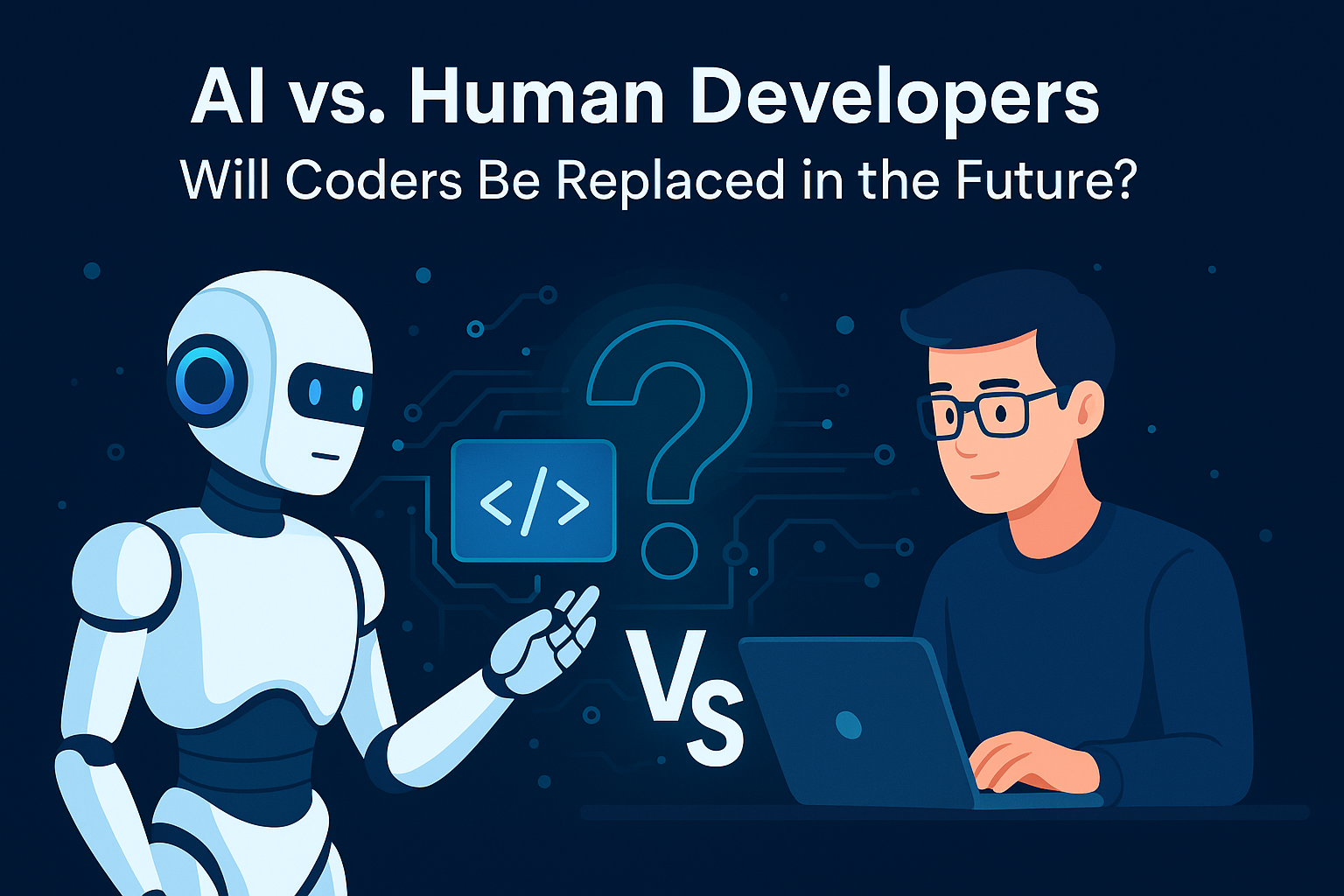Table of Contents
ToggleIntroduction: Why This Question Won’t Go Away
Not too long ago, the idea of a computer “writing code” sounded like a plotline from a futuristic sci-fi movie. You’d picture blinking green text on a black screen, some mysterious robot engineer, and perhaps a dramatic background score.
Fast forward to today, and the reality is both exciting and unsettling. AI tools like GitHub Copilot, ChatGPT, TabNine, and Replit’s Ghostwriter are no longer novelties — they’re becoming a part of a developer’s daily workflow.
So main question : AI vs. Human Developers: Will Coders Be Replaced in the Future?
Whether you’re a seasoned engineer or a college student learning Python, you’ve probably heard the whispers:
“If AI can code, what happens to us?”
The truth isn’t simple. Some believe AI will free developers from tedious work, letting them focus on creativity. Others fear it’s the first step toward mass developer unemployment. The reality lies somewhere in between — and that’s what we’ll explore.

The Human Developer: More Than Lines of Code
To understand whether AI can replace human developers, we need to recognize what developers actually do. Spoiler: it’s not just “writing syntax.”
1. Developers Solve Ambiguous Problems
Imagine a startup founder saying:
“I need an app like Uber but for pets.”
AI can’t take this vague sentence and design a market-ready product with the right features, user flows, and business logic. A human developer will ask questions like:
- What kind of pets?
- Is there a delivery element?
- How do payments work?
- What happens if an order is canceled?
This translation from business need to technical blueprint is something AI struggles with because it lacks contextual understanding.
2. Developers Think Beyond the Dataset
AI learns patterns from data. Humans can invent patterns that never existed before.
For example: when the first responsive web design concept emerged, there was no historical dataset for it — it came from human creativity in solving the challenge of multiple screen sizes.
3. Developers Manage Trade-Offs
Real-world coding is full of decisions like:
- Speed vs. security
- Performance vs. cost
- Simplicity vs. flexibility
These trade-offs often depend on subtle factors — company culture, target audience behavior, or regulatory compliance — that an AI wouldn’t instinctively know.
How AI is Entering the Coding Arena
We’re past the “can AI code?” phase. The question now is how it’s doing it — and how well.
AI-Powered Code Generators
GitHub Copilot, powered by OpenAI’s Codex, can autocomplete functions, write unit tests, and even suggest architectural patterns. Developers describe it as “pair programming with a tireless partner” — but also note that it can make silly mistakes if you don’t keep an eye on it.
Bug Hunting at Machine Speed
Security companies like DeepCode use AI to scan repositories and find vulnerabilities in seconds. While no system is perfect, AI bug detection tools are increasingly reliable, helping teams reduce the time spent on manual code reviews.
Smarter Testing & Deployment
CI/CD pipelines are getting an AI upgrade — from predicting which test cases are likely to fail to automatically rolling back problematic deployments. It’s like having a safety net that learns from every release.
Strengths and Weaknesses: AI vs. Humans
| Criteria | AI Strength | Human Strength |
|---|---|---|
| Speed | Writes code instantly | Can slow down for quality and deliberate design |
| Scalability | Handles massive datasets with ease | Adapts to niche, domain-specific challenges |
| Creativity | Generates variations on known patterns | Creates entirely new concepts and architectures |
| Context | Often misunderstands project nuances | Reads subtle cues from clients and team members |
The Replacement Myth
Automation history teaches us that jobs rarely disappear entirely — they evolve.
When ATMs became widespread, many predicted the death of bank tellers. Instead, tellers’ roles shifted toward customer service, loan processing, and relationship management.
The same pattern is emerging in software development: AI will take over repetitive coding tasks, freeing humans to focus on strategy, design, and supervision.
💡 If you want to see a list of real-world MERN Stack projects that can help you stay ahead in this AI-driven job market, check out my detailed guide here: MERN Stack Projects to Get a Job in 2025.
What Coding Might Look Like in 2035
Here’s a possible day in the life of a future developer:
- Morning: Define a set of requirements in natural language.
- Midday: Review AI-generated code, spot flaws, and approve changes.
- Afternoon: Work with clients to refine features based on feedback.
- Evening: Push updates with AI-assisted testing and monitoring.
The job title might not be “developer” anymore — it could be “AI systems architect” or “digital product designer.”
Skills Developers Need to Stay Ahead
If you want to future-proof your career, start mastering the skills AI can’t easily mimic:
- AI literacy: Understand how AI models work so you can guide them effectively.
- Cross-disciplinary thinking: Combine tech knowledge with industry-specific expertise.
- Leadership & communication: Be the bridge between clients, teams, and technology.
- Ethical awareness: Anticipate potential misuse or harm from a technical decision.
The Ethics AI Can’t Write
AI can generate code that works but still violates ethical standards. Imagine AI building a recruitment system that unintentionally favors certain demographics because of biased training data — this has already happened in real life.
Humans remain the moral compass in software development. Our role is to ask:
“Is this the right thing to build?”
Final Verdict
Will coders disappear? No.
Will the nature of coding change forever? Absolutely.
AI will be our co-pilot, not our replacement. The most successful developers will be those who direct AI, correct AI, and enhance AI — rather than compete with it.
FAQs
Q1: Can AI build software without humans?
A: It can create prototypes, but full products require human planning, ethics, and context.
Q2: Will junior developers lose their jobs first?
A: Some entry-level coding may be automated, but new oversight roles will emerge.
Q3: Is AI code bug-free?
A: No, AI can still produce security flaws and logic errors.
Q4: How can a developer stay relevant?
A: Learn AI tools, strengthen creativity, and develop leadership skills.
Q5: Is AI making coding harder or easier?
A: Easier for repetitive tasks, harder for innovation because expectations are higher.



